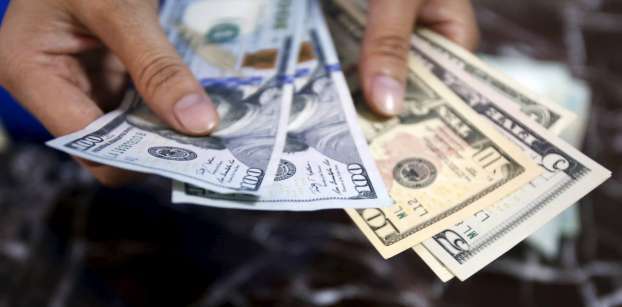Latest NEWS
- Aswat Masriya, the last word
- Roundup of Egypt's press headlines on March 15, 2017
- Roundup of Egypt's press headlines on March 14, 2017
- Former Egyptian President Hosni Mubarak to be released: lawyer
- Roundup of Egypt's press headlines on March 13, 2017
- Egypt's capital set to grow by half a million in 2017
- Egypt's wheat reserves to double with start of harvest -supply min
- Roundup of Egypt's press headlines on March 12, 2017
Egypt's central bank raises pound 7 pt in exceptional auction - sources
CAIRO, Mar 16 (Aswat Masriya) - The Central Bank of Egypt (CBE) raised the Egyptian pound 7 piastres, to 8.78 pounds against the dollar during an exceptional auction on Wednesday, banking sources said.
The bank offered $1.5 in today's auction which is the third in a series of three exceptional auctions that the bank has held over the past three days. But three banking sources told Aswat Masriya that the CBE recalled the dollars it sold today, asking the banks that bought them to place them in a one-year deposit at an interest rate of 1.23 per cent.
Today's auction was held to cover "clients' foreign currency refinance" from import transactions, the bank had said in a statement on its website before the auction. The auction comes just two days after the bank devalued the Egyptian pound from 7.73 pounds to the dollar to 8.85, a drop by 14.5 per cent.
After depreciating the pound on Monday, the CBE said it is adopting a more "flexible exchange rate regime", adding that it "will not hesitate to use all its tools and authority to maintain an orderly foreign exchange market."
Although in CBE auctions, the Egyptian pound has been unchanged from 7.73 to the dollar since November, the exchange rate has been much higher on the parallel market which the CBE has adopted numerous measures throughout the past year to curb. Last week, the dollar was close to selling for 10 Egyptian pounds on the black market.
Hany Genena, research analyst at Beltone Financial investment bank had told Aswat Masriya on Monday that it is important for the CBE to not go back to fixing the exchange rate again to prevent currency speculation. Genena said the CBE needs to change the price of the pound daily by a "piastre or two or more," adding that people need to forget the idea of a fixed rate.
After the pound was depreciated on Monday, the International Monetary Fund (IMF) welcomed the move. Both the IMF and the World Bank previously advised Egypt to follow a more flexible approach to foreign exchange. In October 2015, the Financial Times, cited the global chief economist at Renaissance Capital as saying that the Egyptian pound is the "most overvalued currency with a current account deficit in emerging markets."
A more flexible exchange policy means bringing the rate closer to the local currency's real value, which is determined by the strength of the economy. This involves lifting measures put in place to protect the local currency, allowing its value to be decided according to supply and demand.
Earlier this week the CBE sold nearly $400 million at a price of 8.85 pounds to the dollar, in exceptional auctions on Monday and Tuesday. The CBE also injected $500 million into banks in an exceptional auction last week to cover the imports of basic commodities. The exceptional auctions come in place of three weekly auctions, held every Sunday, Tuesday and Thursday, in which the bank usually sells $40 million.
The dollar shortage in Egypt comes after years of political turmoil have taken a toll on the economy. Egypt's foreign reserves inched up at the end of February by 56 million dollars reaching 16.533 billion, still less than half of the foreign reserves Egypt had before the 2011 Uprising when they were almost $36 billion.











